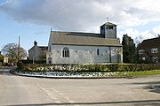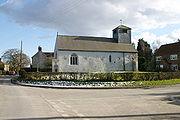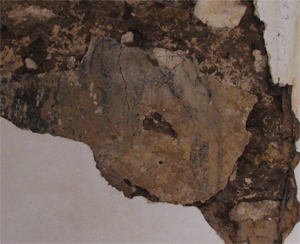
Bielby
Encyclopedia
Bielby is a village and civil parish in the East Riding of Yorkshire
, England
. The village is situated about 4 miles (6.4 km) south of Pocklington
.
 According to the 2001 UK census
According to the 2001 UK census
, Bielby parish had a population of 281.
About two miles north-east of Bielby, on the edge of Hayton
, lie the ruins of an ancient Roman military fortress, an important archaeological site. The University of Durham, Dept of Archaeology, led an excavation between 1995 and 1998 with assistance from local residents and University of Leeds students. A well, a bath-house and many other parts of the Roman fortress have been identified. http://www.arch.soton.ac.uk/Research/Hayton/index.htm
About 1,000 years ago, after the Danes invaded as far east as Kiev, it is believed that a Slavonic mercenary with the Danes (possibly from Biele-rus Belarus
the land of White Russia, just north-west of Kiev) was given charge of a small farm to raise ducks and geese for the Pocklington estate as a reward for his service with the Danish conquerors (although he probably was not Danish). If so, then the name Bielby means 'White farm' or the 'farm of the man from the land of white'. An interesting fact from the late twentieth century that may lend credence to the Belarusian link theory is that the national publications of Belarus used to spell the name of their nation Bielarus in all western European languages until just recently. Biele means 'white' in Russian. Debate continues to this day on why the land of Bielarus was called Biele (white). A common theory is that 'Biele' refers to the scores of Birch trees scattered all over Bielarus. During the 9th century when the Vikings contacted Rus lands as far south as Kiev, the Slavs had solidified their influence and settlements in Bielarus. Thus the Slavs were historically positioned well to provide mercenaries for the Danes.
The Danes and their 'mercenaries' set up Jarvik as their ruling headquarters in England. Jarvik eventually became York as the pronunciation was modified slowly over time. The discovery in the 1970s of an archaeological treasure of information depicting this era of York's history is organized at the Jorvik Viking Centre in York.
The village of Bielby was a duck and goose farm for the Pocklington Estate. The nearby hay farm grew into Hayton. The nearby grist mill grew into Millington
. And Mr. Beli managed to secure an improved water supply for his farm, called Bieli's farm, or Beli's farm . The village has been called Beli's Farm, Bielby, Beilby and a variety of other names; then finally Bielby. Until recently, residents named Bielby lived in the village. The last Bielby was an Alice Bielby who formerly taught in the village school during the middle 20th century. Some residents of Bielby were unable to recollect when she either moved or died; it was sometime in the 1950s or 1960s. There are no known Bielbys left in the village. There are people bearing the name Bielby or Beilby living across England, Canada, the USA, Australia and elsewhere. Some Bielbys who spread throughout England became famous for their glass-blowing skill. The Beilby goblets boast the highest auction prices of any King's goblets sold in markets in recent history. Rev. Beilby Porteus
was a well-known preacher and author who was Bishop of London
from 1787 until his death in 1809.
An interesting alternate theory on the origin of the name Bielby claims Roman roots. This is certainly plausible with the ruins of the Roman fort just 2 miles from Bielby. However, hard evidence lacks to support this theory. Citing a small portion of their article at surnamedb "This interesting and unusual name is locational. Its origins are Norse-Viking pre 9th century, and it derives either from the two villages called "Beelby" in Lincolnshire, and "Bielby" in Yorkshire or from individual farms of the same spelling. The name translates as "Beli's farm", with "Beli" being a popular tribal name originally from the Roman (Latin) "Belli" meaning war or war-like, and the usual Norse term for a farm "bi". Both placenames are first recorded in the Domesday Book of 1086 in the spelling of "Belebi", although the surname is much later."
Read more: http://www.surnamedb.com/Surname/Bielby#ixzz1VLZ6NGcZ
Because the surname roots historically appear only after the Danes entrance into northern England, the conscript warrior theory may bear more support.
There are roads named Bielby in Lawrenceville, Indiana (USA), in Chapel Hill (near Brisbane) Australia, and in Beverley, East Riding of Yorkshire (England).
One home in Bielby is proudly named Bielbyville. Most homes in Bielby have a name plate sign displayed either on the front exterior wall or in the yard (even though the homes are modest in size).
Bielby has an Anglican church (St. Giles), which dates back more than 900 years. The Methodist
revival which swept England and America in the 18th century still has a visible presence in Bielby, although the old Methodist Church building in the village is now a private residence. Some of the Bielbys in Canada and America have known forefathers who were Methodist (see the John Bielby family and descendants from Lake City, Michigan, immigrating from Ontario to Michigain in about 1900. Also his grandfather, Richard Milson Bielby, was a noted Holiness Church member in Huntsville, Ontario during the last half of the 19th century). Traces of Methodist influence from England into America via the Bielbys exist primarily in Canada. Other than St. Giles Church, the old Methodist Church-which is now a home, no other religious organizations were represented in Bielby.
In addition to St. Giles, The College Arms (a small pub serving lunch and dinner), Bielby is mostly residential, with a few newer homes. Geese are still raised on the edge of the village. The Pocklington Canal
still provides a splendid water supply for such purposes. A Beck also runs close to Bielby and used to drive an old flour Mill, but from time to time it can flood, as it did in June 2007, overflowing the streets of Bielby up to the doorsteps of some homes.
Much of the information in this article was gathered from two booklets that an Anglican priest wrote, and from visiting the village and interviewing residents or observation. A copy of the Bielby histories may be purchased in St Giles Church (confirmed in 2001).
Some Bielby's have their names spelled Beilby or Beelby on different documents. This was many times unintentional. In some cases it was intentional to alleviate regular errors.
 The parish church of St Giles has recently been restored. All the grey plaster has been taken off and the underside of it has been restored to its former glory. Under the plaster there is an amazing sandstone wall. Two arches on the outside and a pillar on the inside have been uncovered, including a skeleton on the wall inside. Removal of the external rendering has uncovered a hidden history of the church, with pillars and arches now visible, part of what would have been a larger structure. Inside an ancient painting in blue has been revealed, showing the legs of St Christopher. The picture shows a portion of the wall, taken Christmas Day 2008. The box pews are among the best-preserved in the East Riding of Yorkshire.
The parish church of St Giles has recently been restored. All the grey plaster has been taken off and the underside of it has been restored to its former glory. Under the plaster there is an amazing sandstone wall. Two arches on the outside and a pillar on the inside have been uncovered, including a skeleton on the wall inside. Removal of the external rendering has uncovered a hidden history of the church, with pillars and arches now visible, part of what would have been a larger structure. Inside an ancient painting in blue has been revealed, showing the legs of St Christopher. The picture shows a portion of the wall, taken Christmas Day 2008. The box pews are among the best-preserved in the East Riding of Yorkshire.
East Riding of Yorkshire
The East Riding of Yorkshire, or simply East Yorkshire, is a local government district with unitary authority status, and a ceremonial county of England. For ceremonial purposes the county also includes the city of Kingston upon Hull, which is a separate unitary authority...
, England
England
England is a country that is part of the United Kingdom. It shares land borders with Scotland to the north and Wales to the west; the Irish Sea is to the north west, the Celtic Sea to the south west, with the North Sea to the east and the English Channel to the south separating it from continental...
. The village is situated about 4 miles (6.4 km) south of Pocklington
Pocklington
Pocklington is a small market town and civil parish situated at the foot of the Yorkshire Wolds in the East Riding of Yorkshire, England, approximately east of York....
.

United Kingdom Census 2001
A nationwide census, known as Census 2001, was conducted in the United Kingdom on Sunday, 29 April 2001. This was the 20th UK Census and recorded a resident population of 58,789,194....
, Bielby parish had a population of 281.
About two miles north-east of Bielby, on the edge of Hayton
Hayton, East Riding of Yorkshire
Hayton is a village in the East Riding of Yorkshire, England. It is situated approximately south of the market town of Pocklington and north west of the market town of Market Weighton. It lies on the A1079 road....
, lie the ruins of an ancient Roman military fortress, an important archaeological site. The University of Durham, Dept of Archaeology, led an excavation between 1995 and 1998 with assistance from local residents and University of Leeds students. A well, a bath-house and many other parts of the Roman fortress have been identified. http://www.arch.soton.ac.uk/Research/Hayton/index.htm
About 1,000 years ago, after the Danes invaded as far east as Kiev, it is believed that a Slavonic mercenary with the Danes (possibly from Biele-rus Belarus
Belarus
Belarus , officially the Republic of Belarus, is a landlocked country in Eastern Europe, bordered clockwise by Russia to the northeast, Ukraine to the south, Poland to the west, and Lithuania and Latvia to the northwest. Its capital is Minsk; other major cities include Brest, Grodno , Gomel ,...
the land of White Russia, just north-west of Kiev) was given charge of a small farm to raise ducks and geese for the Pocklington estate as a reward for his service with the Danish conquerors (although he probably was not Danish). If so, then the name Bielby means 'White farm' or the 'farm of the man from the land of white'. An interesting fact from the late twentieth century that may lend credence to the Belarusian link theory is that the national publications of Belarus used to spell the name of their nation Bielarus in all western European languages until just recently. Biele means 'white' in Russian. Debate continues to this day on why the land of Bielarus was called Biele (white). A common theory is that 'Biele' refers to the scores of Birch trees scattered all over Bielarus. During the 9th century when the Vikings contacted Rus lands as far south as Kiev, the Slavs had solidified their influence and settlements in Bielarus. Thus the Slavs were historically positioned well to provide mercenaries for the Danes.
The Danes and their 'mercenaries' set up Jarvik as their ruling headquarters in England. Jarvik eventually became York as the pronunciation was modified slowly over time. The discovery in the 1970s of an archaeological treasure of information depicting this era of York's history is organized at the Jorvik Viking Centre in York.
The village of Bielby was a duck and goose farm for the Pocklington Estate. The nearby hay farm grew into Hayton. The nearby grist mill grew into Millington
Millington, East Riding of Yorkshire
Millington is a small village and civil parish in the East Riding of Yorkshire, England. It is situated approximately north east of Pocklington.The civil parish is formed by the village of Millington and the hamlets of Great Givendale and Ousethorpe....
. And Mr. Beli managed to secure an improved water supply for his farm, called Bieli's farm, or Beli's farm . The village has been called Beli's Farm, Bielby, Beilby and a variety of other names; then finally Bielby. Until recently, residents named Bielby lived in the village. The last Bielby was an Alice Bielby who formerly taught in the village school during the middle 20th century. Some residents of Bielby were unable to recollect when she either moved or died; it was sometime in the 1950s or 1960s. There are no known Bielbys left in the village. There are people bearing the name Bielby or Beilby living across England, Canada, the USA, Australia and elsewhere. Some Bielbys who spread throughout England became famous for their glass-blowing skill. The Beilby goblets boast the highest auction prices of any King's goblets sold in markets in recent history. Rev. Beilby Porteus
Beilby Porteus
Beilby Porteus , successively Bishop of Chester and of London was an Anglican reformer and leading abolitionist in England...
was a well-known preacher and author who was Bishop of London
Bishop of London
The Bishop of London is the ordinary of the Church of England Diocese of London in the Province of Canterbury.The diocese covers 458 km² of 17 boroughs of Greater London north of the River Thames and a small part of the County of Surrey...
from 1787 until his death in 1809.
An interesting alternate theory on the origin of the name Bielby claims Roman roots. This is certainly plausible with the ruins of the Roman fort just 2 miles from Bielby. However, hard evidence lacks to support this theory. Citing a small portion of their article at surnamedb "This interesting and unusual name is locational. Its origins are Norse-Viking pre 9th century, and it derives either from the two villages called "Beelby" in Lincolnshire, and "Bielby" in Yorkshire or from individual farms of the same spelling. The name translates as "Beli's farm", with "Beli" being a popular tribal name originally from the Roman (Latin) "Belli" meaning war or war-like, and the usual Norse term for a farm "bi". Both placenames are first recorded in the Domesday Book of 1086 in the spelling of "Belebi", although the surname is much later."
Read more: http://www.surnamedb.com/Surname/Bielby#ixzz1VLZ6NGcZ
Because the surname roots historically appear only after the Danes entrance into northern England, the conscript warrior theory may bear more support.
There are roads named Bielby in Lawrenceville, Indiana (USA), in Chapel Hill (near Brisbane) Australia, and in Beverley, East Riding of Yorkshire (England).
One home in Bielby is proudly named Bielbyville. Most homes in Bielby have a name plate sign displayed either on the front exterior wall or in the yard (even though the homes are modest in size).
Bielby has an Anglican church (St. Giles), which dates back more than 900 years. The Methodist
Methodism
Methodism is a movement of Protestant Christianity represented by a number of denominations and organizations, claiming a total of approximately seventy million adherents worldwide. The movement traces its roots to John Wesley's evangelistic revival movement within Anglicanism. His younger brother...
revival which swept England and America in the 18th century still has a visible presence in Bielby, although the old Methodist Church building in the village is now a private residence. Some of the Bielbys in Canada and America have known forefathers who were Methodist (see the John Bielby family and descendants from Lake City, Michigan, immigrating from Ontario to Michigain in about 1900. Also his grandfather, Richard Milson Bielby, was a noted Holiness Church member in Huntsville, Ontario during the last half of the 19th century). Traces of Methodist influence from England into America via the Bielbys exist primarily in Canada. Other than St. Giles Church, the old Methodist Church-which is now a home, no other religious organizations were represented in Bielby.
In addition to St. Giles, The College Arms (a small pub serving lunch and dinner), Bielby is mostly residential, with a few newer homes. Geese are still raised on the edge of the village. The Pocklington Canal
Pocklington Canal
The Pocklington Canal is a broad canal which runs for through nine locks from the Canal Head near Pocklington in the East Riding of Yorkshire, England, to the River Derwent which it joins near East Cottingwith...
still provides a splendid water supply for such purposes. A Beck also runs close to Bielby and used to drive an old flour Mill, but from time to time it can flood, as it did in June 2007, overflowing the streets of Bielby up to the doorsteps of some homes.
Much of the information in this article was gathered from two booklets that an Anglican priest wrote, and from visiting the village and interviewing residents or observation. A copy of the Bielby histories may be purchased in St Giles Church (confirmed in 2001).
Some Bielby's have their names spelled Beilby or Beelby on different documents. This was many times unintentional. In some cases it was intentional to alleviate regular errors.
Parish church


